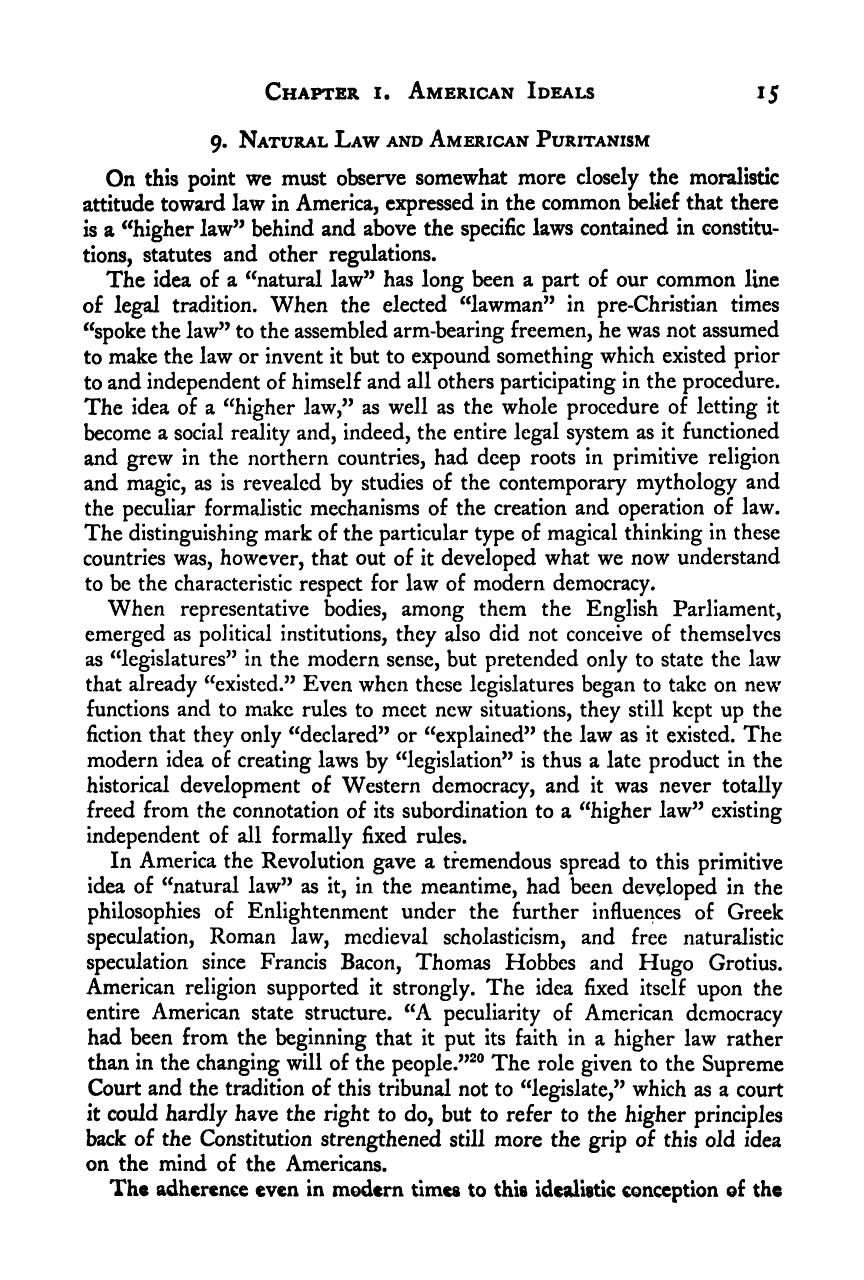Note: Gunnar Myrdal died in 1987, less than 70 years ago. Therefore, this work is protected by copyright, restricting your legal rights to reproduce it. However, you are welcome to view it on screen, as you do now. Read more about copyright.
Full resolution (TIFF) - On this page / på denna sida - I. The Approach - 1. American Ideals and the American Conscience - 9. Natural Law and American Puritanism

<< prev. page << föreg. sida << >> nästa sida >> next page >>
Below is the raw OCR text
from the above scanned image.
Do you see an error? Proofread the page now!
Här nedan syns maskintolkade texten från faksimilbilden ovan.
Ser du något fel? Korrekturläs sidan nu!
This page has never been proofread. / Denna sida har aldrig korrekturlästs.
Chapter i. American Ideals 15
9. Natural Law and American Puritanism
On this point we must observe somewhat more closely the moralistic
attitude toward law in America, expressed in the common belief that there
is a ^^higher law” behind and above the specific laws contained in constitu-
tions, statutes and other regulations.
The idea of a ^^natural law” has long been a part of our common line
of legal tradition. When the elected “lawman” in pre-Christian times
“spoke the law” to the assembled arm-bearing freemen, he was not assumed
to make the law or invent it but to expound something which existed prior
to and independent of himself and all others participating in the procedure.
The idea of a “higher law,” as well as the whole procedure of letting it
become a social reality and, indeed, the entire legal system as it functioned
and grew in the northern countries, had deep roots in primitive religion
and magic, as is revealed by studies of the contemporary mythology and
the peculiar formalistic mechanisms of the creation and operation of law.
The distinguishing mark of the particular type of magical thinking in these
countries was, however, that out of it developed what we now understand
to be the characteristic respect for law of modern democracy.
When representative bodies, among them the English Parliament,
emerged as political institutions, they also did not conceive of themselves
as “legislatures” in the modern sense, but pretended only to state the law
that already “existed.” Even when these legislatures began to take on new
functions and to make rules to meet new situations, they still kept up the
fiction that they only “declared” or “explained” the law as it existed. The
modern idea of creating laws by “legislation” is thus a late product in the
historical development of Western democracy, and it was never totally
freed from the connotation of its subordination to a “higher law” existing
independent of all formally fixed rules.
In America the Revolution gave a tremendous spread to this primitive
idea of “natural law” as it, in the meantime, had been developed in the
philosophies of Enlightenment under the further influences of Greek
speculation, Roman law, medieval scholasticism, and free naturalistic
speculation since Francis Bacon, Thomas Hobbes and Hugo Grotius.
American religion supported it strongly. The idea fixed itself upon the
entire American state structure. “A peculiarity of American democracy
had been from the beginning that it put its faith in a higher law rather
than in the changing will of the people.”^® The role given to the Supreme
Court and the tradition of this tribunal not to “legislate,” which as a court
it could hardly have the right to do, but to refer to the higher principles
back of the Constitution strengthened still more the grip of this old idea
on the mind of the Americans.
The adherence even in modern times to this idealistic conception of the
<< prev. page << föreg. sida << >> nästa sida >> next page >>